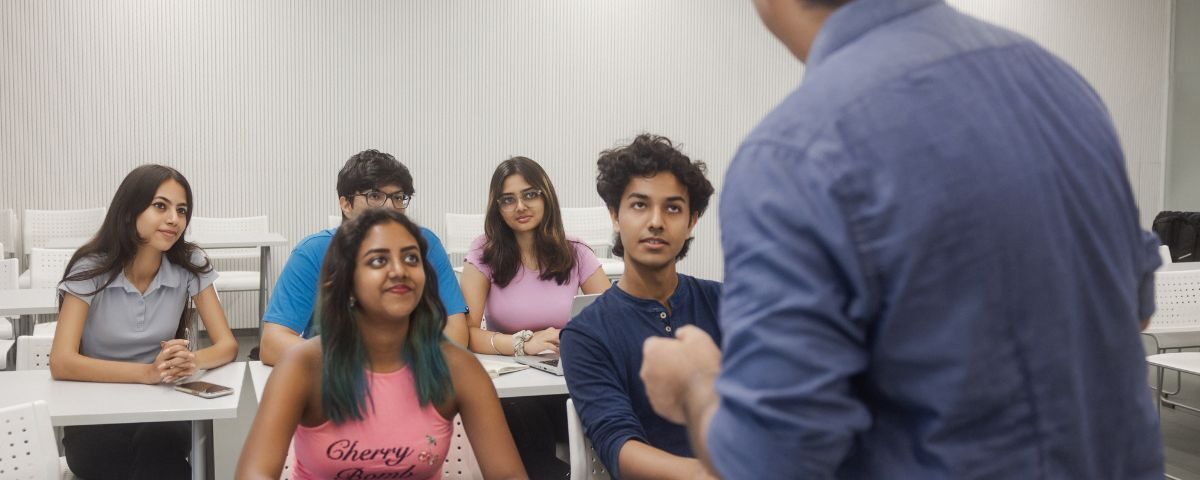
Top Resume Summary Examples for Freshers: Your Practical Guide to Standing Out!
July 13, 2025
The Ultimate Guide to Adding Certifications in Resume for Freshers
July 27, 2025Essential Soft Skills for Resume Freshers: Stand Out to Employers
Embarking on your professional journey as a fresher is an exciting time, filled with dreams and aspirations. You’ve worked hard, honed your academic prowess, and perhaps even mastered some impressive technical skills. Yet, as you prepare your resume and step into the competitive job market, there’s a powerful, often underestimated, asset that truly makes your application shine and unlocks incredible career opportunities: soft skills. These aren’t just buzzwords; they are the very essence of how you work, communicate, and solve problems, with personality traits forming the foundation of soft skills and fundamentally shaping your career trajectory.
Employers today profoundly value strong soft skills, recognising that they enhance productivity, boost job satisfaction, and elevate overall performance within a team. What’s more, these attributes are often the decisive factor when recruiters must choose between applicants who possess similar academic backgrounds and technical experience. For job seekers, decision-making and creativity are considered valuable soft skills, essential for problem-solving, leadership, and adaptability in the workplace. In a world where many new graduates arrive with comparable qualifications and foundational knowledge, your ability to navigate interpersonal dynamics, adapt to new challenges, and collaborate effectively becomes your most compelling differentiator. Soft skills are important for job seekers entering the workforce because they help connect with employers, fit into diverse work environments, and support long-term professional success. It’s about showcasing not just what you know, but how you apply that knowledge and interact with the world around you.
What Exactly Are Soft Skills, Anyway? Definition and Importance
So, what exactly are these elusive “soft skills”? Simply put, they are the personal attributes and interpersonal abilities that empower you to interact effectively with others in any professional setting. Unlike hard skills, which are often technical, quantifiable, and specific to a particular task—like coding, data analysis, or using specialised software—soft skills are more about your approach to work and your relationships with colleagues and clients. They encompass a wide range of qualities, including communication, teamwork, problem-solving, and time management. In most job descriptions, technical abilities and the technical skills required for the role are listed alongside resume soft skills, highlighting the importance of both measurable, teachable skills and key personal attributes.
The beauty of soft skills is that they are not something you’re simply born with; they are skills that can be developed and refined through consistent practice, diverse experiences, and dedicated training. You can develop soft skills through practical activities such as volunteering, taking on leadership roles, seeking mentorship, and actively requesting feedback to improve your interpersonal effectiveness. Think of them as the core competencies universally sought after in every profession, regardless of industry or role.
While hard skills are typically taught explicitly in classrooms or through certifications, soft skills are often learned implicitly through real-world interactions and challenges. The profound truth is that while hard skills might get you an interview, your soft skills are what will truly help you keep the job and advance in your career. This is why understanding and cultivating these less tangible, yet profoundly impactful, interpersonal abilities is so vital for your long-term success. The soft skills required for success—such as communication, adaptability, and teamwork—complement the technical skills needed for each position, making both essential for thriving in any professional environment.
Why Soft Skills Are Your Ultimate Game-Changer
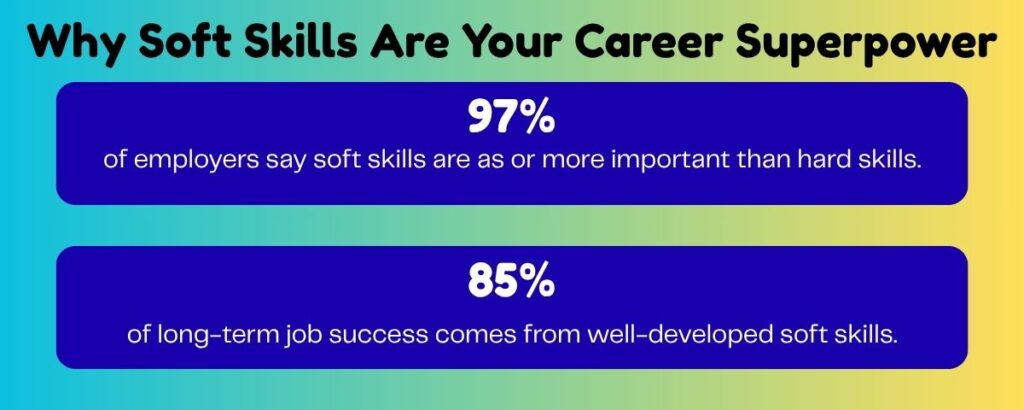
You might wonder just how important soft skills truly are, especially when you’re focused on building a strong foundation of technical expertise. The statistics paint a compelling picture: these skills are not merely a bonus; they are your ultimate game-changer in the professional arena.
Consider this: more than half of new employees who fail within their first months do so not because they lack technical skills, but because they lack crucial soft skills. A staggering % of new hires fail within this period, and an overwhelming % of these failures are attributed to deficits in areas like coachability, emotional intelligence, motivation, and temperament, not to a lack of technical competence, which accounts for only % of failures. This reveals a powerful truth: companies can teach you the tools and processes, but they rely on you to bring the right mindset and interpersonal capabilities. For freshers, this is a profound realisation: investing in your soft skills isn’t just about impressing recruiters; it’s about building a resilient foundation that prevents early career pitfalls and ensures long-term job security and growth. In fact, having the right soft skills—such as communication, adaptability, and teamwork—can make all the difference, as employers are looking for the most important soft skills that match the demands of the role.
Furthermore, employers overwhelmingly value soft skills in their hiring decisions. A remarkable % of employers state that soft skills are either an essential or very important factor when they consider candidates. This sentiment is echoed across various studies, with figures ranging from % to % highlighting their critical role. Soft skills are often specifically mentioned in job descriptions, and showcasing them can significantly contribute to your professional growth. Looking beyond the initial hire, a Carnegie Mellon Foundation study revealed that % of long-term job success hinges on an employee’s soft skills. Another LinkedIn study found that % of employers actually value soft skills more than hard skills when making new hire decisions. Clearly, for freshers, these personal attributes are just as important as technical skills in getting hired and, crucially, in getting ahead.
Your Essential Soft Skills Toolkit: What Employers Really Want
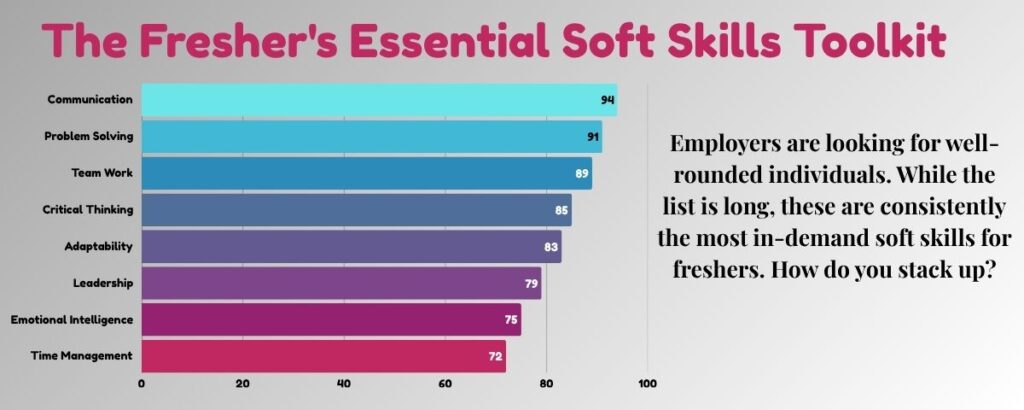
Now that you understand the immense value of soft skills, let’s explore some of the most sought-after attributes that employers are actively looking for in candidates, especially freshers. Identifying key soft skills and including a soft skills list tailored to in-demand soft skills for your industry is essential to stand out in today’s competitive job market.
Critical Thinking: Becoming a Master Problem-Solver
Critical thinking is a cornerstone soft skill that involves actively analysing information, evaluating evidence, and making informed, logical decisions. It’s about moving beyond simply recalling information to truly questioning assumptions, identifying biases, and considering multiple perspectives before concluding. This skill is absolutely essential for solving complex problems, identifying new opportunities, and driving innovation within any organisation.
Employers consistently seek candidates who can think critically and make sound judgments, because these individuals are equipped to navigate challenges and contribute meaningfully. When you possess strong critical thinking abilities, you’re not just reacting to problems; you’re proactively dissecting them, exploring alternative solutions, and even fostering creativity by challenging the status quo. This foundational skill empowers you to be proactive, innovative, and adaptable in any professional setting, making you an invaluable asset in industries that demand continuous evolution. The good news is that critical thinking skills can be developed through deliberate practice, targeted training, and real-world experience.
When highlighting critical thinking or other valuable soft skills on your resume or in interviews, be sure to provide concrete examples that demonstrate these abilities in action. For instance, examples of soft skills such as communication, teamwork, leadership, and problem-solving can make your qualifications more tangible and credible to employers.
Leadership and Teamwork
Leadership Skills
Leadership is far more than a job title; it’s a set of behaviours and a mindset that can be cultivated by anyone, regardless of their formal position. Leadership skills are essential for motivating and inspiring others to achieve common goals, fostering an environment where everyone feels empowered to contribute. This involves setting clear direction, building trust among team members, and empowering individuals to take ownership of their work.
Employers highly value individuals who can communicate effectively, make tough decisions when necessary, and consistently drive results. A key aspect of leadership, even in entry-level roles, is dependability—the ability to be trusted to finish tasks on time and hold yourself accountable. A simple yet powerful way to demonstrate leadership early in your career is by taking initiative: volunteer for new projects, propose solutions, and go beyond your defined responsibilities. Taking on project management responsibilities, even on a small scale, is an excellent way to showcase your leadership and organisational skills to employers. These skills, like all soft skills, can be developed through experience, dedicated training, and mentorship. True leadership is about influence and proactivity, contributing to collective success no matter where you stand in the hierarchy.
Teamwork and Collaboration
In today’s interconnected workplaces, teamwork and collaboration are absolutely critical soft skills. They involve working effectively with others to achieve shared objectives, recognising that collective effort often yields superior results. To truly work effectively, you need strong people skills, which include the ability to communicate, empathise, and resolve conflicts. Successful collaboration requires open communication, active listening, and a genuine willingness to compromise and find common ground.
Employers actively seek candidates who can work collaboratively, build strong professional relationships, and contribute positively to team success. Teamwork not only helps you build strong relationships but also enhances your people skills by encouraging empathy, communication, and understanding among colleagues. The beauty of developing your teamwork skills is that it often acts as a catalyst for strengthening other crucial soft skills, such as problem-solving, communication, and critical thinking. Every group project, every club activity, and every volunteer effort you participate in isn’t just about the immediate task; it’s a holistic training ground where you practice communicating ideas, listening to diverse perspectives, negotiating solutions, and collectively brainstorming. Teamwork skills can be actively developed through group projects, volunteering experiences, and various team-building activities. Strong soft skills, particularly in collaboration, naturally drive initiative among employees, leading to project advancement and positive outcomes.
Communication and Problem Solving
Active Listening
Effective communication is a two-way street, and its cornerstone is active listening. Interpersonal skills and good communication skills play a crucial role in active listening, as they enable individuals to engage effectively, interpret non-verbal cues, and respond appropriately. This vital soft skill involves truly paying attention to others, understanding their underlying needs, and responding thoughtfully and appropriately. It’s far more than just hearing words; it’s about comprehending the full message, including non-verbal cues, and providing feedback to ensure mutual understanding.0
Active listening is essential for building trust, resolving conflicts constructively, and providing excellent customer service.0 When individuals feel truly heard and understood, it fosters a sense of psychological safety, which is crucial for open feedback and effective collaboration. Employers highly value candidates who can listen actively, communicate effectively, and respond thoughtfully, as these individuals contribute to a healthy, productive team culture. Strong communication skills are a key differentiator in the workplace, setting candidates apart in both managerial and collaborative roles. Communication, in its broader sense—the ability to convey ideas and feelings effectively—is consistently among the top soft skills employers require across all fields. Like other soft skills, active listening can be honed through consistent practice, targeted training, and diverse experiences.0
Problem Solving
Problem-solving is a critical soft skill that involves a dynamic process: identifying challenges, meticulously analysing relevant data, and then developing creative and effective solutions. Creative skills and attention to detail are crucial soft skills for effective problem solving, enabling professionals to approach challenges from multiple angles while ensuring accuracy and thoroughness in their solutions. This isn’t just about finding an answer; it requires a blend of creativity, sharp critical thinking, and a willingness to take calculated risks to innovate.
Employers are always on the lookout for candidates who can solve complex problems, think outside the box, and drive innovation. The process of problem-solving is often a continuous learning loop; it’s not enough to simply arrive at a solution. Truly effective problem-solvers analyze
how they reached that solution, what worked well, what could be improved, and what lessons can be extracted for future challenges. This reflective practice is a hallmark of individuals with a growth mindset, who view challenges and even setbacks as opportunities for learning and development. Problem-solving skills can be significantly developed through practice, specialised training, and real-world experience.
Emotional Intelligence and Adaptability
Emotional Intelligence
Emotional intelligence (EI) is a vital soft skill that involves understanding and managing your own emotions, as well as accurately recognising and influencing the emotions of those around you. It’s a cornerstone for building strong professional relationships, communicating effectively, and making informed decisions that consider the human element.
Employers highly value candidates who can manage their emotions, empathise with others, and build trust within a team. High emotional intelligence correlates with better performance, effective conflict resolution, and higher employee engagement and retention. This means that individuals with strong EI can reduce workplace friction, improve team cohesion, and foster a positive work environment, all contributing to long-term organisational success. Maintaining a positive attitude is a key aspect of emotional intelligence, as it helps build trust and encourages a supportive, thriving workplace culture. EI is typically broken down into four core components: self-awareness (understanding your own emotions), self-management (controlling your reactions), social awareness (recognising others’ emotions, including empathy), and relationship management (influencing and resolving conflicts). Emotional intelligence can be developed through self-awareness practices, targeted training, and accumulating diverse experiences.
Adaptability
In today’s fast-paced, ever-changing professional landscape, adaptability is a critical soft skill. It involves being flexible, resilient, and genuinely open to change, embracing new situations rather than resisting them. This skill is absolutely essential for navigating uncertainty, embracing new technologies as they emerge, and driving innovation within your role and organisation.
Employers actively seek candidates who can adapt quickly, learn from setbacks, and thrive even in ambiguous situations. An adaptable individual doesn’t merely cope with change; they actively seek learning opportunities and contribute to a company’s overall flexibility and resilience. This makes them incredibly attractive to forward-thinking employers who need agile workforces capable of continuous evolution. Adaptability can be developed through gaining experience, participating in training programs, and cultivating a strong growth mindset that views challenges as opportunities. In fact, adaptability is considered one of the most valuable transferable skills for career advancement, as it demonstrates your ability to succeed across different roles and industries.
Cultivating Your Soft Skills: Practical Ways to Grow
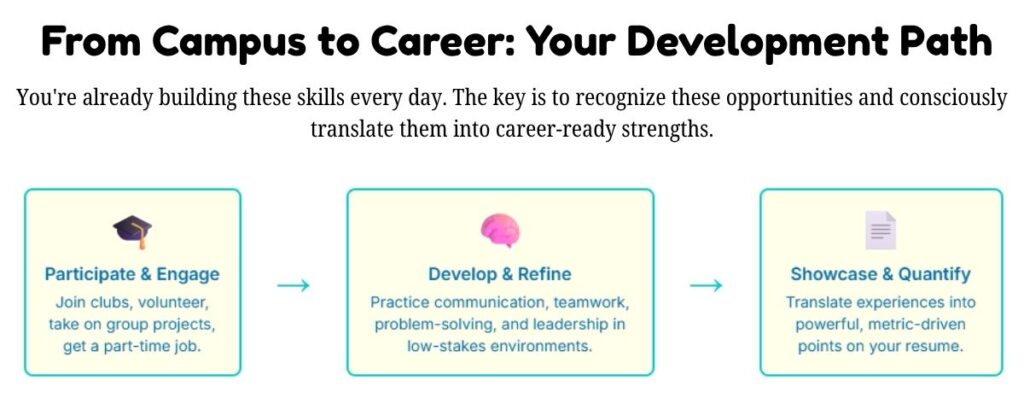
Developing your soft skills is an ongoing journey, and as a fresher, you have countless opportunities to cultivate these invaluable attributes, often outside of traditional coursework. To improve soft skills, engage in self-reflection, seek feedback, participate in targeted training, and apply these skills in real-world situations. These experiences not only build your capabilities but also provide compelling examples for your resume and interviews.
One of the most effective avenues for freshers to develop these crucial skills is through internships, volunteering, and extracurricular activities. These pursuits offer authentic, low-stakes environments to practice and refine essential soft skills. For instance, participating in team sports or joining student associations is excellent for developing teamwork, time management, leadership, and effective communication. When you take on the responsibility of organising events or managing projects, you naturally enhance your problem-solving abilities, foster autonomy, spark creativity, and learn to deal with unforeseen challenges calmly and proactively.
Volunteering in your community instils compassion, empathy, a strong sense of responsibility, and a solid work ethic. If you’ve ever joined a debate club or a public speaking group, you’ve actively enhanced your communication, persuasion, and critical thinking skills. Even learning a new language demonstrates open-mindedness, an enthusiasm for learning, and a remarkable capacity for adaptability. Furthermore, challenging travel experiences can build cultural awareness, refine your planning and budgeting skills, and significantly boost your adaptability.
The power of these experiences lies in their “transferability.” They allow you to draw direct parallels between your non-traditional pursuits—like leading a student club or organising a charity event—and the demands of a professional role. A resume that highlights more than just your academic course of study, one that tells the story of your resourcefulness, curiosity, and desire to challenge yourself, will truly stand out. These activities effectively reframe your personal growth as valuable professional training, showcasing the best soft skills for a resume that employers are actively seeking. Be sure to incorporate soft skills into your resume and interviews by drawing on these experiences and providing specific examples that demonstrate your abilities.
Making Your Resume Shine: Highlighting Your Soft Skills
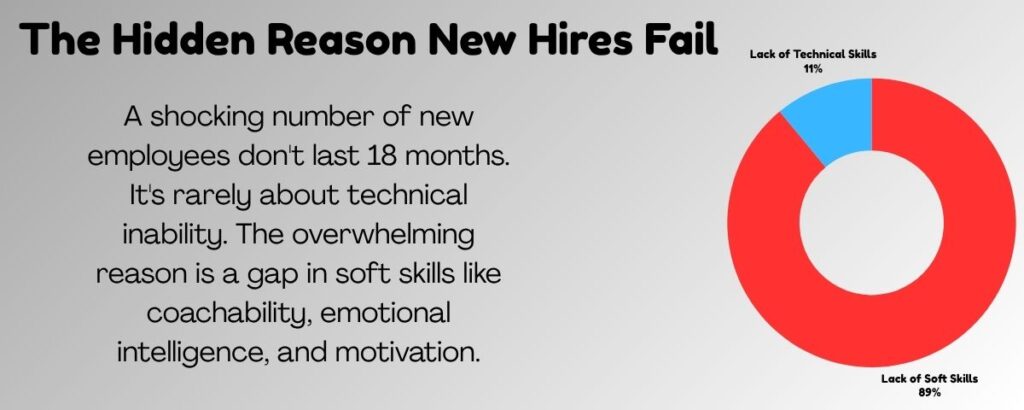
Once you’ve cultivated these essential soft skills, the next step is to highlight them effectively on your resume. The golden rule here is to “show, don’t tell”. Simply listing “team player” or “good communicator” won’t impress; you need to provide concrete evidence of these abilities in action. When listing soft skills, be sure to include soft skills examples that demonstrate how you have applied these abilities in real situations.
It’s also crucial to understand the role of Applicant Tracking Systems (ATS). These software programs are used by nearly all large companies, including % of Fortune 00 firms, to screen resumes before a human ever sees them. An ATS scans your resume for specific keywords, including both hard and soft skills, from the job listing. Therefore, tailoring your resume to the specific job you’re applying for and matching your resume keywords to those found in the job description is paramount. This strategic optimisation is your gateway to getting past the initial screening. To stand out, highlight soft skills and integrate soft skills throughout your resume by embedding them in your work experience, summary, and skills sections.
To effectively integrate your soft skills, weave them throughout your entire resume: in your summary, skills section, and especially within your work experience descriptions. When describing your experiences, use powerful action verbs such as “managed,” “created,” “developed,” and “improved” to showcase your soft skills. Provide specific examples of how you applied these skills in previous roles or projects, even if they were academic or volunteer-based. To truly make an impact, quantify your achievements with metrics and statistics. For instance, instead of saying “improved team communication,” try “increased team productivity by % through effective communication and collaboration”. Using specific, quantifiable examples adds immense credibility to your claims. Remember to avoid overused buzzwords like “team player,” as these can dilute your resume’s effectiveness. When considering how many soft skills to include, focus on all the soft skills that are most relevant to the job and company culture, ensuring you prioritise those that align with the job description.
For freshers, a well-crafted resume objective can be particularly beneficial. This concise statement, placed at the top of your resume, should clearly articulate your career goals, job aspirations, and relevant soft skills. Ensure it’s focused and tailored to the specific job description, incorporating keywords from the listing to describe your soft skills and objectives. Including the right skills on your resume and tailoring them to the job description will help you make a stronger impression.
Here’s a helpful guide to action verbs and how to quantify your soft skills, making your resume stand out. When listing soft skills in your work experience, be sure to provide soft skills examples that demonstrate your impact and abilities:
Soft Skill Category | Action Verbs to Use (Examples) | Quantifiable Achievement Example |
|---|---|---|
Communication | Addressed, Articulated, Collaborated, Drafted, Formulated, Influenced, Lectured, Negotiated, Persuaded, Presented, Wrote | “Developed and delivered 0+ presentations to diverse audiences, leading to a % increase in project understanding.” |
Leadership | Administered, Chaired, Coordinated, Delegated, Developed, Directed, Established, Led, Managed, Oversaw, Supervised | “Led a team of volunteers for a community event, increasing participant engagement by 0%.” |
Problem-Solving | Analysed, Clarified, Critiqued, Diagnosed, Evaluated, Identified, Investigated, Resolved, Solved, Streamlined, Troubleshot | “Analysed customer feedback data, identifying key issues and implementing solutions that reduced complaints by 0%.” |
Teamwork | Collaborated, Coordinated, Facilitated, Participated, Supported, Team-built, Unified | “Collaborated with a cross-functional team on a major project, delivering it weeks ahead of schedule.” |
Adaptability | Adjusted, Adapted, Embraced, Flexed, Learned, Navigated, Pivoted, Responded, Shifted | “Quickly adapted to new virtual collaboration tools during remote transition, maintaining 00% project continuity.” |
Organization | Arranged, Catalogued, Compiled, Coordinated, Executed, Implemented, Maintained, Organized, Planned, Prioritized, Scheduled | “Managed weekly payroll and expense reporting for 0+ employees, ensuring 00% on-time processing.” |
Creativity | Conceptualised, Created, Designed, Developed, Devised, Fashioned, Illustrated, Innovated, Invented, Originated, Redesigned | “Designed a new marketing campaign concept that increased social media engagement by %.” |
Beyond the Resume: Acing Your Interview with Soft Skills
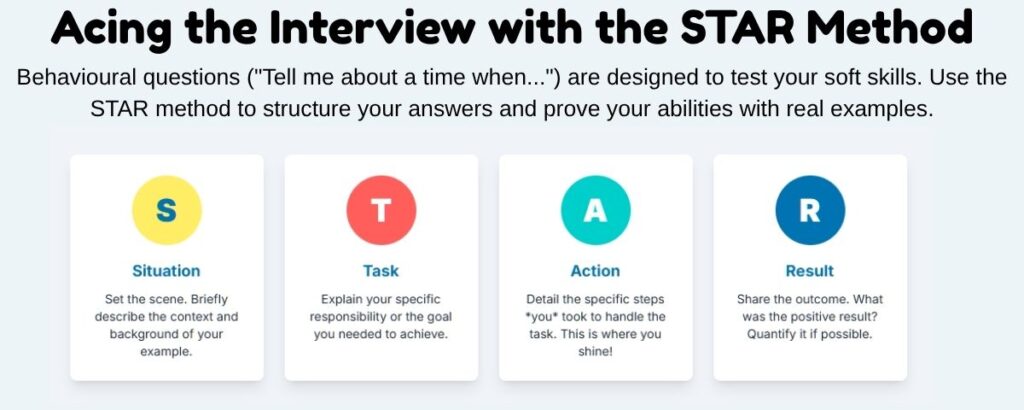
Getting your resume noticed is a significant first step, but the interview is where your soft skills truly come alive. Employers don’t just want to read about your abilities; they want to see them in action. This is why they heavily rely on behavioural interview questions to assess your soft skills. These questions are designed to elicit specific examples of your past behaviour, as a strong predictor of how you’ll perform in future scenarios.
To ace these questions, master the STAR method: Situation, Task, Action, Result. This structured approach helps you tell a compelling story that showcases your soft skills effectively:
Situation: Begin by setting the context for your story. Describe the background and the challenge you faced. What was the scenario you encountered?
Task: Next, explain the specific task or your responsibilities related to the soft skill you want to highlight. What needed to be done?
Action: Detail your specific actions to address the situation or task. What did
you do? Be sure to use those powerful action verbs here.
Result: Finally, explain the outcome of your actions, emphasising how your use of soft skills contributed to the success. What was the positive impact?
Practising the STAR method with compelling examples from your academic projects, volunteer work, or extracurricular activities is not just a helpful tip; it’s a necessity to convert resume interest into a job offer. This is your ultimate opportunity to demonstrate that your claimed soft skills are genuinely integrated into your professional toolkit.
Here are some typical behavioural questions you might encounter:
Teamwork: “Tell me about a time when you had difficulty getting others to work together on a critical problem and how you handled it.”
Communication: “Describe a situation where you persuaded others.”
Problem-Solving: “Give me an example of a time you provided an innovative solution.”
Adaptability: “Describe a situation in which you were able to overcome a personality conflict in order to get results.”
Leadership: “Tell me about a time when you took charge of a project and achieved successful results.”
Soft Skills for Remote Success

The professional landscape is continuously evolving, with remote and hybrid work models becoming increasingly common. In these environments, certain soft skills become even more critical, amplifying their importance for your daily productivity, team cohesion, and individual career success.
Virtual Communication is paramount for remote workers, as it involves communicating effectively through digital channels like email, instant messaging, and video calls. It demands strong written and verbal communication skills, along with the ability to build trust and rapport with colleagues and clients without the benefit of in-person interactions. Employers highly value remote workers who can communicate clearly, collaborate virtually, and drive results in a distributed environment. These skills, like all communication abilities, can be developed through consistent practice and experience in digital settings.
Self-motivation is another vital soft skill for remote workers. When you’re not in a traditional office setting, you need to be self-directed, disciplined, and inherently motivated to stay productive. This requires a strong ability to work independently, manage your time effectively, and prioritise tasks without constant oversight. In particular, strong time management skills are essential for remote workers to plan, prioritise, and efficiently handle multiple tasks, ensuring deadlines are met and productivity remains high. Employers seek remote workers who can motivate themselves, manage their time efficiently, and consistently deliver results in a remote work environment. Cultivating self-motivation, like other soft skills, is a journey of practice and experience.
Beyond these, other soft skills that are amplified in a remote setting include robust time management, heightened adaptability to new digital tools and workflows, proactive problem-solving for technical glitches, and seamless collaboration across different time zones. In a remote or hybrid environment, where informal channels of communication and oversight are reduced, these specific soft skills are not just beneficial; they are foundational for your daily effectiveness, ability to collaborate, and overall career progression. They serve as the invisible glue that holds remote teams together and ensures individual success.
Your Journey Starts Now!
As you stand at the threshold of your professional life, remember that your soft skills are truly your secret weapon. They are not merely supplementary; they are essential for career success, distinguishing you in a competitive job market and paving the way for long-term fulfilment. While your academic achievements and technical competencies are undoubtedly important, it’s your ability to communicate, collaborate, solve problems, lead, adapt, and understand emotions that will truly define your professional journey.
The most encouraging aspect is that these crucial skills are not fixed traits; they can be developed and strengthened through consistent practice, diverse experiences, and dedicated training. Every group project, every volunteer opportunity, and every extracurricular activity has already contributed to building your unique set of best soft skills for your resume. Employers are actively seeking candidates who demonstrate both strong hard skills and well-honed soft skills, recognising that this combination is a decisive factor in employability and overall organisational success.
So, as you craft your resume and prepare for interviews, embrace the power of your soft skills. Articulate them with confidence, illustrate them with compelling examples, and continue to cultivate them throughout your career. Your journey starts now, and with a focus on these invaluable attributes, you are well-equipped to not only land your dream job but also to thrive, innovate, and make a lasting impact in the professional world.

